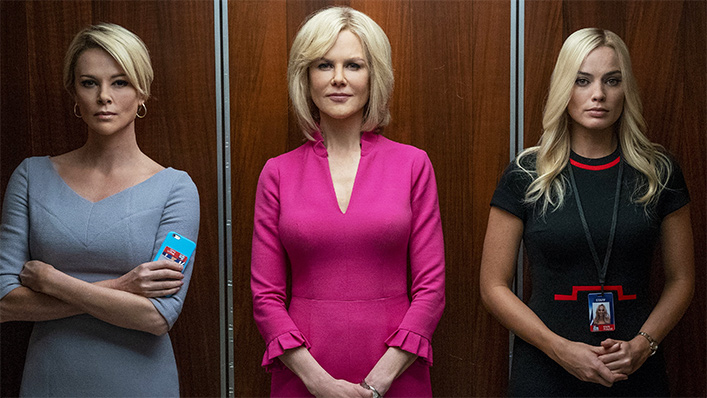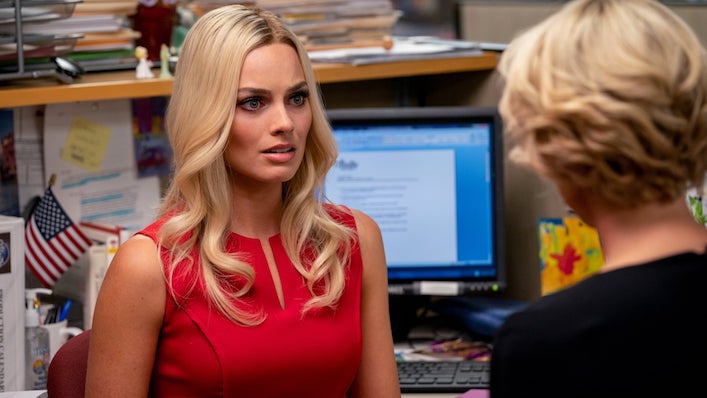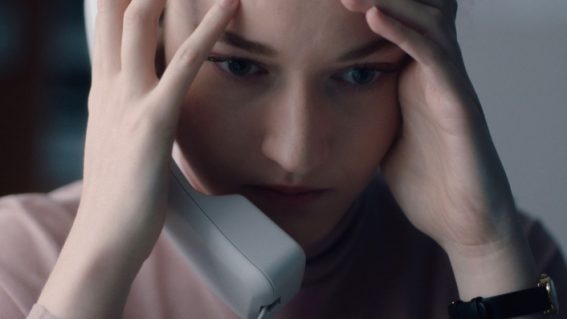A star-studded cast is the best thing about the #MeToo drama Bombshell

Sisters are doing it for themselves in this star-studded but superficial breakdown of the Fox News sexual harassment scandal, writes Eliza Janssen.
In the trailers and promotional material for Jay Roach’s Bombshell, we see three women sharing an elevator to somewhere important. They are portrayed by some of the greatest actresses of our time: Charlize Theron, Nicole Kidman and Margot Robbie. The triumphant ‘yass queen’ shot seemed to suggest these three will have to team up in order to speak truth to power.
But Bombshell’s structure is instead three parallel stories of injustice. Anchor-woman Megyn Kelly (Theron) is being undermined by higher-ups for challenging then-candidate Donald Trump. Former morning TV star Gretchen Carlson (Kidman) is ousted from two jobs for being “sexy but too much work.” And Robbie’s semi-fictional composite character Kayla, an “evangelical millennial” is being primed for airtime at great cost to her dignity.
The narrative threads combine to form a perky, comprehensive retelling of the Fox News scandal that got head honcho Roger Ailes unceremoniously fired after countless accusations of sexual harassment. Bombshell has a similarly caffeinated ‘edutainment’ feel to Vice and The Big Short, which all use newsreel footage and sassy dialogue to confront underlying American power structures. More so than those equally flashy films, though, Bombshell has a distinct political emptiness that extends to its simplistic characterisations, no matter how much star-power it packs into that elevator.
Universal equality doesn’t seem to be much of a factor in any of the heroic female protagonist’s missions. Megyn insists that her annoyance with Roger Ailes’ consistent misogyny is purely a personal disagreement, affirming “I’m a lawyer, not a feminist.” Smartly, Charles Randolph’s fast-paced script uses each woman’s ambition and conservatism against them, examining what happens when a ruthless propaganda machine turns on those who helped create it. Each woman is forced to come terms with being “the story” that they would typically report as snowflake hysteria (“News is like a ship,”Ailes huffs; “take your hand off the wheel and it turns left”).
At the end of the day, though, I kind of don’t need to be told that this is a man’s world by the dude that directed Austin Powers: The Spy Who Shagged Me. Indeed, Bombshell can almost be seen as penance for the identical, hypersexual Fembots of those comedy films, given the women Roach and Randolph choose to focus on in their growth from victims to rebels are all white, blonde, rich. And conventionally attractive, a fact which the film acknowledges in the ever-present beauty pageant hair and smoky eyeshadow each woman sports. “Why do soldiers all dress alike?”, Gretchen wonders aloud in voice-over, before answering herself: “it’s so they know that they’re replaceable.”
The #MeToo movement was sparked initially by black civil rights activist Tarana Burke approximately ten years before the Fox News scandal broke. Bombshell’s entertaining storytelling can feel like a glamorised, ‘palatable’ version of a far more widespread and intersectional movement. The women’s relative privilege doesn’t detract from their experience of harassment, but it’s disheartening that one of the first films to draw directly from the #MeToo movement starts so distinctly at the top of the food chain.
At the same time, the film also opts for the tired approach of preaching to the converted, wherein the use of progressive, liberal Hollywood talent can come across as grotesque condescension. Jokes like Megyn Kelly sighing that Trump “will never become President” are meant to be amusing because we, a smug 2020 audience, know that Americans indeed elected Trump; but to laugh at a Fox News figurehead for being incorrect isn’t exactly ground-breaking political humour.

For the most part, Bombshell is happy to not interrogate its characters’ values, making Robbie’s enthusiastic Sunday schooler routine light-hearted comedy and Kidman and Theron’s activism something they only seem to follow through on after watching their sleeping kids and thinking: “hey, what if sexism affects my female family members???”
Bizarrely, one character who feels finely drawn and emotionally developed is the villainous ogre of the piece: John Lithgow in a fat suit as Roger Ailes. He’s loathsome, but he’s also afforded a few moments of pathos, where we understand from his humiliated posture that all his patriarchal sliminess comes from a very human desperation. Why is that a greater level of complexity and depth than any of our three heroes are allowed to explore?
If the team behind Bombshell had expended a little bit more of that challenging, thoughtful characterisation to the rest of its story, it might stand out amidst a field of more impactful, ongoing true stories about gender discrimination and similar adaptations, such as Stan’s The Loudest Voice. Instead, we get a zippy retelling of a world-shattering chapter in media history that tends more towards sensationalism than revelation. Then again, maybe sensationalism is unavoidable in a film about the rise and rise of Fox News.

















